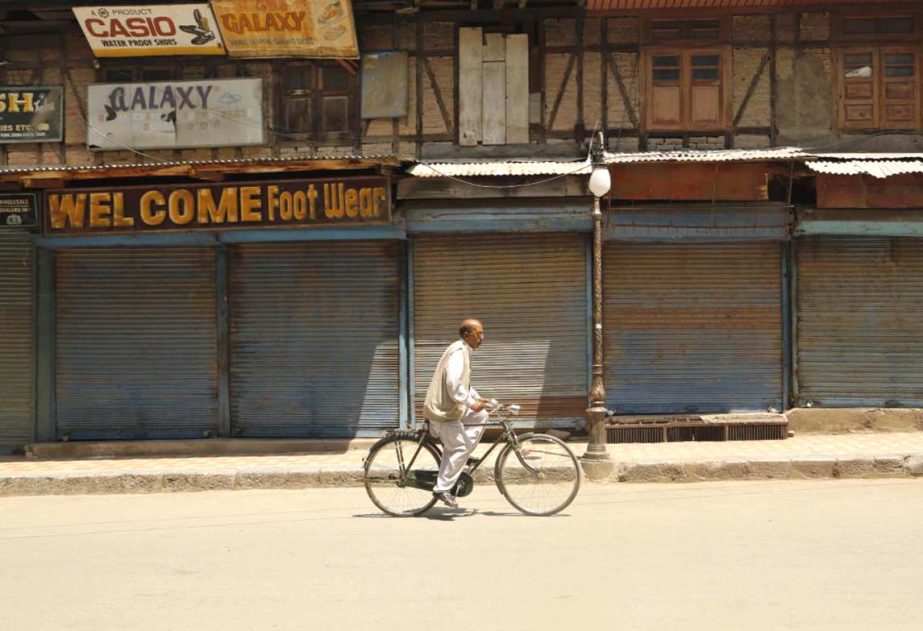
AP, Srinagar, India :
Stores, businesses and schools slammed shut across Indian-controlled Kashmir on Wednesday after separatists called a strike to protest a series of assassination-style killings over the past week.
Security forces patrolled the streets of Indian Kashmir’s main city, Srinagar, and buses and taxis stayed off the roads. Many government employees also stayed home.
Authorities say their initial investigations indicated that rebels killed the four victims, each with a close-range shot to the back of the head. But separatists challenging India’s sovereignty say secret government agencies were behind the killings. The murders occurred in the town of Sopore.
Kashmir has a long history of brutality on both sides. Separatists say the recent murders echo the style of the “Ikhwanis,” the government-sponsored Kashmiri militias that killed hundreds of rebels and activists in the 1990s.
The killings began last week when gunmen shot and killed a well-known separatist activist in Sopore. That was followed by the deaths of two former rebels and a separatist sympathizer.
Separatists have called for a Friday rally in Sopore.
Anti-India feelings run deep in Kashmir, the country’s only majority-Muslim state, where nearly a dozen rebel groups have been fighting Indian rule since 1989. About 68,000 people have been killed in the conflict. The rebel groups have largely been suppressed by India in recent years, and resistance is now principally through street protests.
Kashmir is divided between India and Pakistan but claimed by both in its entirety. Rebels want the region to merge with Pakistan or to become independent.
Meanwhile, US Secretary of State John Kerry has called Pakistan’s Prime Minister Nawaz Sharif and discussed bilateral ties and regional situation including the recent increase in tension between Pakistan and India.
The call between the two leaders took place soon after Prime Minister Narendra Modi called Mr Sharif and greeted him on the eve of the holy month of Ramadan.
“I talked today with Prime Minister Nawaz Sharif of Pakistan regarding a recent increase in the tensions publicly between India and Pakistan. It’s of enormous concern to all of us for all the obvious reasons,” Mr Kerry told State Department reporters in a conference call from his home town of Boston where he is recovering from a leg injury.
“These are two very, very important countries playing a critical role with respect to regional interests, and it’s very, very important that there be no misinterpretation or miscalculation with respect to any of the back-and-forth and the empowerment some entities might feel as a result of that,” Mr Kerry said.
Stores, businesses and schools slammed shut across Indian-controlled Kashmir on Wednesday after separatists called a strike to protest a series of assassination-style killings over the past week.
Security forces patrolled the streets of Indian Kashmir’s main city, Srinagar, and buses and taxis stayed off the roads. Many government employees also stayed home.
Authorities say their initial investigations indicated that rebels killed the four victims, each with a close-range shot to the back of the head. But separatists challenging India’s sovereignty say secret government agencies were behind the killings. The murders occurred in the town of Sopore.
Kashmir has a long history of brutality on both sides. Separatists say the recent murders echo the style of the “Ikhwanis,” the government-sponsored Kashmiri militias that killed hundreds of rebels and activists in the 1990s.
The killings began last week when gunmen shot and killed a well-known separatist activist in Sopore. That was followed by the deaths of two former rebels and a separatist sympathizer.
Separatists have called for a Friday rally in Sopore.
Anti-India feelings run deep in Kashmir, the country’s only majority-Muslim state, where nearly a dozen rebel groups have been fighting Indian rule since 1989. About 68,000 people have been killed in the conflict. The rebel groups have largely been suppressed by India in recent years, and resistance is now principally through street protests.
Kashmir is divided between India and Pakistan but claimed by both in its entirety. Rebels want the region to merge with Pakistan or to become independent.
Meanwhile, US Secretary of State John Kerry has called Pakistan’s Prime Minister Nawaz Sharif and discussed bilateral ties and regional situation including the recent increase in tension between Pakistan and India.
The call between the two leaders took place soon after Prime Minister Narendra Modi called Mr Sharif and greeted him on the eve of the holy month of Ramadan.
“I talked today with Prime Minister Nawaz Sharif of Pakistan regarding a recent increase in the tensions publicly between India and Pakistan. It’s of enormous concern to all of us for all the obvious reasons,” Mr Kerry told State Department reporters in a conference call from his home town of Boston where he is recovering from a leg injury.
“These are two very, very important countries playing a critical role with respect to regional interests, and it’s very, very important that there be no misinterpretation or miscalculation with respect to any of the back-and-forth and the empowerment some entities might feel as a result of that,” Mr Kerry said.

